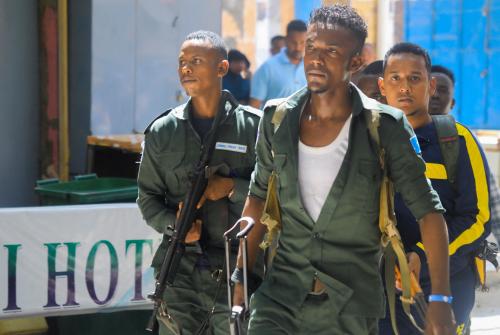Predictably, both supporters and opponents of ballistic missile defenses claim that the events of Sept. 11 strengthen their case. Proponents claim that the attacks showed that we need to protect ourselves against unexpected but devastating threats, while opponents point out that the terrorists did not need ballistic missiles—merely knives and box cutters—to perpetrate their crimes.
President Bush weighed in on the debate last week, arguing that there is no better example of the new threats we face than the Sept. 11 attacks and that “the case is more strong today than it was on Sept. 10 that the Anti-Ballistic Missile Treaty is outmoded.” Bush has a point that the attacks reinforce the case for missile defense, but only for a defense limited in size and scale, and deployed in a way that does not threaten other great powers. Bush will need to show that he understands this point when he meets with Russian and Chinese leaders this weekend at the Asia-Pacific Economic Cooperation summit in Shanghai.
Opponents of missile defense are clearly right that a wide range of threats to the United States exists and that addressing such threats requires resources. If missile defense becomes an exclusive obsession, we may devote too few dollars to counter other, more likely threats through means such as airport security, the Coast Guard, immigration and customs agencies and defenses against chemical or biological attack with “suitcase bombs.” Leading Democrats already were making these arguments before Sept. 11.
Unconstrained pursuit of missile defense could also worsen relations among the major powers, impeding security cooperation on dangers that may be even more pressing. To deal with the terrorist threat, for example, we need the cooperation of Russia and China, primarily to cut off terrorists’ access to financial resources and to track them down through intelligence, customs and law enforcement activities. We also need Russian and Chinese help to put diplomatic pressure on key regional players such as Pakistan and Iran and to halt proliferation so that the next terrorist attack does not involve a weapon of mass destruction.
These realities do not mean that U.S. foreign policy must be designed to please Beijing and Moscow. But we must avoid making them feel threatened if we want them on our side. Given their own sense of the threat from Islamic fundamentalism, China and Russia are likely to join forces with the United States in this fight if we play our cards right.
As missile defense proponents rightly argue, however, the Sept. 11 attacks remind us that seemingly remote or abstract dangers can become tragically real very quickly. That fact bolsters the case for some type of long-range missile defense. Currently, among extremist countries only North Korea is believed to be capable of developing a long-range missile within a few years, but countries such as Iraq and Iran might have them within a decade.
It is true that terrorists probably will never use long-range ballistic missiles against the United States. They do not have the resources to acquire them or the territory on which to base them. Moreover, they can seek to accomplish their hateful goals with less advanced means, such as dispersing biological agents at a sporting event or blowing up a cargo ship full of chemicals as it approaches a port.
Yet even if terrorists may not find ballistic missiles useful, an enemy country might. Being able to threaten the United States with a biological or nuclear weapon on a ballistic missile could allow an adversary state to act aggressively against its neighbors in the hopes that, with Americans at risk, Washington would not retaliate. A hostile state armed with ballistic missiles could also harbor terrorists such as Osama bin Laden, with the knowledge that a U.S. with no missile defense would be highly reluctant to threaten enough force to capture him or overthrow the country’s ruling regime.
The lesson of the terrorist attacks is not that the U.S. should abandon all missile defense plans. Rather, it should pursue a limited long-range missile defense within a framework that reassures Russia and China and that does not hinder other efforts to defend the U.S. against threats that are even more imminent.



Commentary
Op-edSeptember 11 Verdict – Yes to Missile Defense, But Don’t Alienate Russia or China
October 17, 2001